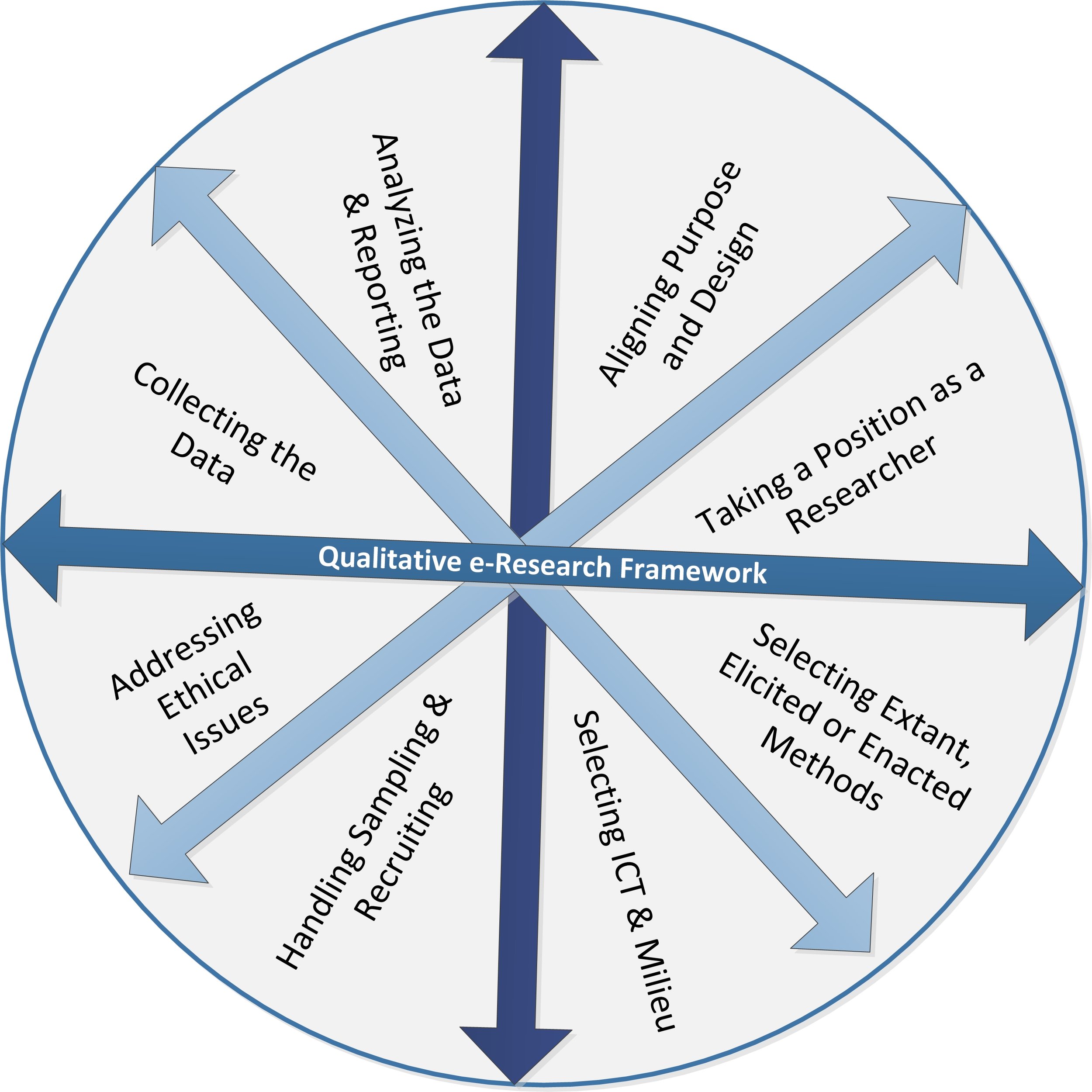Digital Workflows: Special Issue Roundtable 2
Interested in online research? Register now for a May 2024 webinar, “How to do research in a digital world,” livestreamed from the Center for Advanced Internet Studies with Janet Salmons, CAIS fellow, and other researchers from the center.
by Janet Salmons, PhD Manager Sage Research Community
Dr. Salmons is the author of Doing Qualitative Research Online (2022).
How do you design, organize, and manage qualitative research using online tools and applications?
Jessica Lester and Trena Paulus co-authored the book Doing Qualitative Research in a Digital World (2021). They co-edited a December 2023 special issue for the Sage journal, Qualitative Inquiry, “Qualitative inquiry in the 20/20s: Exploring methodological consequences of digital research workflows.”
This special issue focuses on the reciprocal relationship between the digital tools and spaces that we use and the methodologies and methods that we take up in designing and carrying out a qualitative research study.
In addition to reading this excellent collection of articles, you can also listen to the contributors discuss their research, trends, issues, and design considerations. This is the second roundtable discussion; see the first roundtable here.
Digital Workflows: A roundtable discussion with contributors to the special issue
Roundtable Participants and Their Articles
Pengfei Zhao and Peiwei Li
Co-authors of “The Affordances of Videoconferencing Technology for Doing Interviews With Children Online: Methodological Explorations Based on a Critical Ethnography.”
Abstract: In this article, we engage with the concept and theories of “affordance” in the adoption of digital tools to perform qualitative inquiry. We first raise the question of what is afforded when we use online digital tools such as Zoom to interview young children (5–10 years old) and then draw on empirical examples from our multi-sited critical ethnography with transnational Chinese children to illustrate our key methodological points. We lay out three dimensions along which the concept of affordance can be conceptualized: the relational, the embodied situational, and the social-cultural. We discuss the potential to map out a critical approach to enable qualitative researchers to practice reflexivity in technology-mediated qualitative research.Vivek Vellanki
Author, “Image Technologies and Visual Methodologies: Reflections, Experimentations, and Future Redirections.”
Abstract: More images have been made and circulated in the last decade than in all of the 20th century. This is a startling yet obvious fact that illustrates the central role that images have come to play in contemporary life. However, technological changes in image-based practices have outpaced methodological responses to these transformations. In this article, I reflect on some of the drastic transformations that have occurred over the last two decades within the realm of image-making, image-circulation, and image-engagement. I ask: How are emerging tools and practices of image-making and image-circulation shifting how we understand and use visual methodologies? How might an engagement with the works of contemporary artists offer insight into methodological concerns and offer possible methodological responses? To answer these questions, I place artistic works in conversation with scholars who address methodological concerns. I focus on two key aspects of image-based practices: the nature and structure of cameras, and the form of the image alongside the modalities of engaging, circulating, and analyzing images. In each area, I identify a focal artist and a scholar whose work(s) can respond to emergent concerns. Through this dialogue, this article brings to light emergent concerns for scholars interested in engaging with visual methodologies.Pengfei Zhao and Jessica Lester
Co-authors of “Digital Worlds and Our Folding Realities: Implications for Qualitative Inquiry.”
Abstract: In this article, we think with the ongoing conversations on “embracing digital worlds” through juxtaposing the methodological practices enabled by “digital worlds” with the writings of science fiction. Specifically, we leverage the criticality of a Chinese sci-fi text, Folding Beijing, to shed light on issues of equity and justice in qualitative inquiry. This approach allows us to interrogate, problematize, and trespass the boundaries of the digital worlds as well as the underlying digital infrastructure. We discuss three types of boundaries that shape our use of digital tools/spaces: broadband internet accessibility, the borders of language, and universal design and digital inclusion.
See the first roundtable discussion about the special issue, “Digital Worlds and Our Folding Realities: Implications for Qualitative Inquiry.
The discussion featured Susan Naomi Nordstrom, author of “Good, Bad, and Hopefully Not the God Trick: Technological Systems in Qualitative Inquiry,” Shannon A. B. Perry, author of “Embodying Affective Intra-Actions Online: Enacting Posthuman Methods in Virtual Spaces,” Darcy E. Furlong, author of “Enabling Crip Time With Digital Tools in Qualitative Inquiry,” and Luc S. Cousineau, co-author of “Methodology in Motion: Reflections on Using Appnography for the Study of Dating Apps.”
More Sage Research Community Posts about Online Research
Decolonizing research methods means rethinking how we look at participants and problems. In the digital world there are even more ways the European West exerts cultural, economic, and political control. At the same time, the digital world allows researchers to conduct studies across the distances.
Storytelling has been a part of our shared life since the beginning of time. Story-based research approaches are especially valuable when studying sensitive issues or collecting data with vulnerable participants. In today’s digital world we have new ways to share and collect stories in a research context.
Hashtags offer online researchers ways to identify popular topics, trace viral messages, and locate influential thought leaders. Learn more about how researchers use hashtags with this multidisciplinary collection of open access articles.
From the moment social media platforms began to welcome user-generated content, researchers have looked for ways to study it. Learn more with open-access articles about social media platforms.
Qualitative researchers often collect very personal data, whether in interviews or in narratives, diaries, or other records that depict their experiences. One way to protect their identities is by changing their names, and anonymizing the data.
How can you use data science in social science research? Find an interview with the Oxford Internet Institute’s Dr. Bernie Hogan and lots of useful resources in this post.
Learn about connecting the unit of analysis with the qualitative methodology.
These difficult times present challenges for researchers. Find five original posts by Robert Kozinets about using Netnography to study sensitive topics.
Jessica Lester and Trena Paulus co-edited a December 2023 special issue for the Sage journal, Qualitative Inquiry, “Qualitative inquiry in the 20/20s: Exploring methodological consequences of digital research workflows.” Read the articles and watch a roundtable with contributors. This is the second of two discussions of the special issue.
Jessica Lester and Trena Paulus co-edited a December 2023 special issue for the Sage journal, Qualitative Inquiry, “Qualitative inquiry in the 20/20s: Exploring methodological consequences of digital research workflows.” Read the articles and watch a roundtable with contributors. This is the first of two discussions of the special issue.
How can you study digital culture and activism? Watch this interview with Dr. Lyndon Wray.
Learn about ethics and consent for online research from the perspective of an institutional review board member.
Learn about research with online Experiments from Dr. Giuseppe Veltri.
What ethical issues face researchers who study online comments? Paul J. Reilly offers explanations and an open-access research case.
Hear Dr. Kozinets discuss the origins and development of Netnography in this interview. See the whole series of posts from Kozinets about collecting data for studies using netnography.
View a recorded webinar with Dr. Janet Salmons, Research Community Manager for Methodspace and author of Doing Qualitative Research Online, Dr. Stacy Penna, Customer Engagement and Enablement Director for Lumivero (previously NVivo, and Leon Bourner, Director of Sales and Client Development for itracks.
Online researchers face design challenges because they must also consider the implications of the technologies used in the study. By using an iterative, holistic approach, you can look inter-related dimensions of the design.
Listen to this conversation with Dr. Stu Shulman for discussion of implications of current developments for academics.
Listen to a conversation about online methods with Dr. Suzanne Albray, host of the DoBetterResearch podcast series, and Dr. Janet Salmons, Research Community Manager for Methodspace.
This collection of open-access articles offers multiple perspectives on the use of Big Data and ethical protocols for computational research methods.
How can you reduce or eliminate fraudulent responses to online surveys? Jennifer Lawlor explains.
The focus for August 2022 aimed at helping us “Be an Ethical Researcher.”
How can you conduct online research with children and youth? Here are some open-access examples.
Qualitative online research methods continue to emerge and evolve. Learn more in this post.
Ryan Burns explains ways to use open data in digital ethnography. Find an open-access link to the related article in the Qualitative Research journal.
Janet Salmons and Trena Paulus discuss trends in online qualitative research and their new books, Doing Qualitative Research Online and Doing Qualitative Research in a Digital World.
What does Dr. Kate Chatfield, Editor of the Research Ethics journal, have to say about research relevance?
How can you study digital interactions in an ethical way? Learn more in this research interview.































Do you think about research questions as an insider, outsider, or somewhere in between? Why is positionality important in online research?